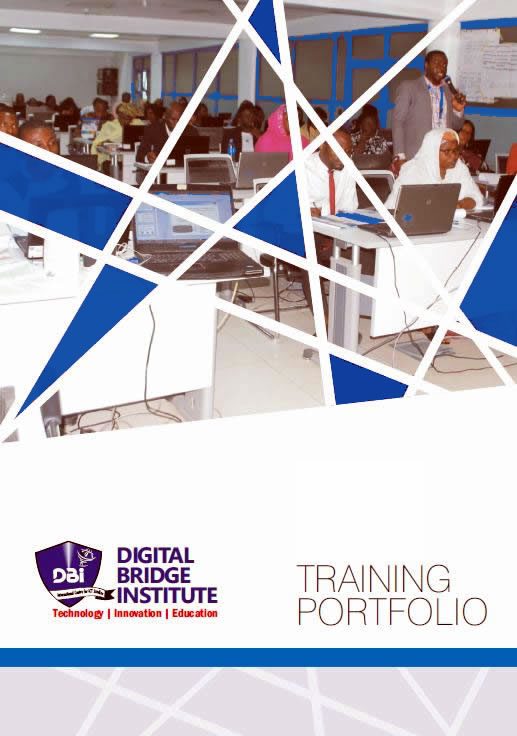In line with its mandate and to underscore the role of ICT in today’s digital economy, the Digital Bridge Institute, DBI, working with other stakeholders in the ICT industry says it has developed the National Occupational Standards, NOS in ICT Trade areas which upon approval by the National Board for Technical Education will become part of the Nigerian Skills Qualification Framework to help regulate trainers and professionals the ICT industry in Nigeria.
 So far there is currently no NOS in the ICT and Telecommunications sector in Nigeria, which according to the Administrator, Digital Bridge Institute, Dr. Ikechukwu Adinde who was speaking at the workshop for the validation of the National Occupational Standards, NOS, if adopted will ensure certification of skills in the sector.
So far there is currently no NOS in the ICT and Telecommunications sector in Nigeria, which according to the Administrator, Digital Bridge Institute, Dr. Ikechukwu Adinde who was speaking at the workshop for the validation of the National Occupational Standards, NOS, if adopted will ensure certification of skills in the sector.
Adinde who was represented by the Head, Academic Programmes, National Innovation Diploma, DBI, Kano, Viola Usoro, “if you want to acquire skill to work in the oil and gas sector there must be a standard that says the kind of skill you must acquire in that field and how you can do it, and if it’s certified by a certification body it ensures quality or the actual competence of the person carrying out the activity. Having said this, the world over, the best practise is certification because in acquiring skill there must be a body that determines the quality of the skill that is being impacted across all occupational sectors or areas”.
The Digital Bridge Institute is driving the National Occupational Standards in ICT and therefore as the certifying body we’re going to be the people ensuring that the process to certify is stipulated and it’s being followed.
It is one thing to stipulate standards and another for the industry buy-in he explained. “We’re therefore going to be marketing this across the ICT industry if they want to get competency. The training that the providers and the training centres are going to be giving will be competency based. There’s a gap in the industry; there’s difficulty finding those who are competent from those who come out from our crop of formal institutions, perhaps because training is not competency based or hands-on. By the time we have this platform, the industry and employers will find it easy to identify and take in people with the exact skills set that they require and the certificate from DBI is a double assurance”.
“NBTE as a board that oversees skills training saw it pertinent that they should collaborate with DBI in the areas of ICT skills training. They brought a broad framework for ensuring certification of skills in ICT and this is the Nigeria’s Skills Qualification Framework. By the time they specified the broad areas, it was now important that we had sessions like this workshop where we get input from stakeholders in the industry that are already working in the six broad areas education and skills and the standards that will be set but we expect that overtime these areas will increase in number”, Adinde said.
The Draft NOS developed by DBI covers the following areas:
- Digital Services Operations
- Creative Media Production
- Mobile Application Development
- Web application Development
- Social Media Communications and
- Telecommunications Systems Installation and Maintenance
The Head, DBI, Lagos Paulinus Ugwuoke however added that when the NOS is finally adopted, it is going to be a guiding document for the industry trainers and professionals in Nigeria, which is why the professionals have been made to input and be a part of the framework for the development of the NOS which will be a framework for curriculum on ICT development in Nigeria.
“The main aim of DBI is to provide the technical knowledge in the NOS ICT trade areas and working in collaboration with NBTE to certify those who have acquired skills in those areas which the government wants to be approved”.
“The stakeholders/professionals were drawn from both government and private sector players; The Nigerian Communications Commission, Nigeria Society of Engineers, NITDA, Nigeria Film Institute, Federal Ministry of Education, Telecoms/ICT experts, Nigeria Computer Society, NBTE and a host of others,” Ugwuoke said.
The NOS framework and implementation according to the Deputy Director, National Skills Qualification Division, NBTE, Otubode Majiyagbe is in the process of being institutionalised in Nigeria, and “good enough DBI on its part has been partnering with us especially in the area of ICT, to develop standard for the sector and the process started since January, 2018 where we invited experts to take a look at the draft submitted by DBI after which we now have another set of experts to look at the earlier one, critique it and make input before coming up with a final document”.
“Today we’re trying to validate which is why we have expanded the scope of participants; especially those from the industry because they know the end users and the kind of skills they want and how these can fit into the industry, because really, the issue has always been that there’s a gap between the industries and the training centres”.
“This is the final stage of the whole process that started in January. FEC approved 6 levels of framework for Nigeria so it’s within these levels that we’re working on a standard. Once the stakeholders validate the document which will be produced in line with international best standards for the industry it will be approved and then rolled out for use”, Otubode said.
Source: Political Economist

